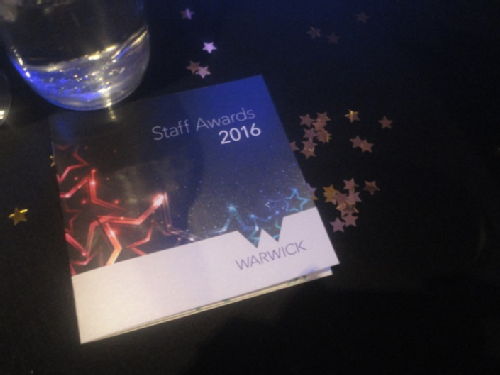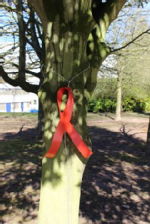On February 1st, I sat on a Question Time session chaired by Isaac Leigh, President of Warwick SU. It was a useful session; I heard concerns raised around a wide range of issues from accommodation, timetabling clashes, provision of gender neutral facilities, free speech, sexual violence and consent workshops to investment in supporting sports societies and providing better facilities for music and arts practice spaces to list a few.
A number of questions came from students who are in the Warwick For Free Education group. They found my answers largely unsatisfactory and protested a few days later. Isaac invited me to meet with them to discuss matters. I did, and we had a good dialogue.
One issue raised was the change from maintenance grants to maintenance loans. I am very concerned about the implications of this change of government policy. When I was in my final year of undergraduate study, over thirty years ago, my maximum grant was a key pillar that enabled me to finish my degree. I felt a connection with this debate, and I agreed that in order to facilitate more discussion, I would be happy to provide a forum for the views expressed by the students in that meeting.
What follows is the viewpoint of the Warwick For Free Education group. This is not an endorsement of those views but I want to air them here – in full, without any editing – so that we might consider these issues further as a community. I do not imply that this group represents all students and do not want to privilege this group. It is the Students’ Union and its sabbatical officers that have this role.
To enable more formal discussions across university channels, a proposal is being sent for consideration at Senate.
I see this as being about facilitating debate. Warwick For Free Education do not. They see this contribution as being about ‘forcing concessions’. It is a view they have expressed on their blog. I do not see providing these opportunities as a concession; there we will simply disagree. I also do not support or condone the way the group conducts protests; invading working space of colleagues with a ‘noise protest’ is, to some, disruptive and intimidating. Perspectives should not be supressed; they should be aired, discussed and challenged, and it is in this context that the space below is offered.
There will be other views and I am happy to facilitate the airing of those as well. I hope that we are able to continue discussion through the wider Warwick community.

-----------------------------------------------------------------------------------------------------------------------------
Why does more debt matter?
On Thursday Jan 13, a backroom committee of just 18 MPs voted to officially abolish maintenance grants. With no parliamentary debate, vote in the Commons, or any semblance of democracy, the Conservatives have cut a major source of financial support for approximately a million students in the UK. Undoubtedly, maintenance grants represent a lifeline for the poorest students, and their abolition is nothing less than catastrophic.
Yet, when confronted with heart-wrenching testimonies about the impact of maintenance grant cuts, the Tories’ major justification has been the minor net increase of overall available funding in the form of maintenance loans. This is, in the strictest sense, factually sound. More money than ever will be provided at the point of access, with maintenance grants converted into loans and more loan than ever made available. Our critique of maintenance grants cuts therefore does not concern itself solely with the removal of financial means, although we also must not ignore the broader austerity programme within and outside education that has seen cuts to Disabled Students’ Allowance. Rather, we condemn these cuts on the grounds of how debt manages us, conditions us and demands of us.
Debt locks us into a relationship of obligation which structures our future aspirations around a schedule of repayment. It is a form of ‘support’ transacted with terms and conditions – an idea that some Tories have outrageously suggested should also extend to Job Seeker’s Allowance. Debt is an act of control rather than compassion, and the cuts amount to little more than leveraging the hardship of the most vulnerable and poorest attending university, inflicting greater pressure and economic constraint to prepare us for, and bind us to, the demands of a labour market under austerity. Faced with the prospect of poverty and debt, we end up with no choice but to navigate a stagnant labour market and to assimilate into an inequitable status quo. Everything we are – everything we could be – is ensnared by a ruthless model of exchange in which our collective futures are risked, and our education, welfare and public infrastructure are forfeited to a rich minority. Our public debt, the outcome of a collective bailing out of a reckless minority of financiers, is transformed into the private debt of those with the least responsibility for it.
Indeed, the Conservative’s programme for Higher Education reform openly describes the purpose of university as a delivering of the ‘pipeline of graduates needed for a 21st century economy’. Debt is a mechanism that ensures our compliance with this function. After all, in order for the student finance system to be financially sustainable in the long term, this debt has to be repaid, else the whole structure will collapse. Even now, for every £1 lent, 45p is unpaid, a crisis of repayment that will only be exacerbated by piling more debt onto poorer students. Working class students are effectively forced to pay more for our education than our richer counterparts, and we will be indebted for longer throughout our lives – due to the freezing (and hence lowering in real terms) of the loan repayment threshold. With more and more draconian measures emerging such as the threat of prosecution for graduates who cannot repay their loan on time, students must enter a debt relation unnavigable for the poorest in society. In effect, the greatest financial burden for the cost of our education is imposed on and underwritten by those who can least afford it.
And for what gain? The Institute for Fiscal Studies has suggested that the abolition of maintenance grants will ‘do little to improve government finances in the long run’, saving a mere £270 million per cohort in public funds. This is negligible, especially when it is set against a context of year-on-year cuts to corporation tax until 2020.
It would appear as if the cuts to maintenance grants are more ideological than economic – after all, we inhabit a class-stratified society, which exhibits strong patterns of reproduced advantage and privilege. In other words, those who are born poor are likely to remain so, regardless of university qualifications. It is the education and lives of the most marginalized that bear the brunt of the merciless Conservative agenda of deficit reduction and balancing-of-the-books. This reflects a broader context: for all the Government’s lip-service to ‘widening participation’ since the introduction of 9K fees, none of this class mobility has materialized in the broader economy. Incomes have stagnated in real terms, job insecurity is rampant, living conditions have declined, and homelessness has increased. Housing benefit cuts for younger tenants have been proposed in the midst of a mass housing crisis, the Tories have decreed that under 25’s do not deserve the living wage because they are not ‘productive enough’, and the prospects of the young and the marginalized seem bleaker than ever. All the while, the 1,000 richest people in the UK have doubled their wealth since the financial crash of 2008. Few have prospered, and many have suffered. This is a situation that cannot go unanswered.
And we can win: grants have been scrapped before, in 1997, but were fought for and won back.. By forging a powerful and broad-ranging movement which is ready to confront a Government uncompromising in its austerity programme – and, atrociously, which abolished maintenance grants in the most opaque and undemocratic of ways - we can win. We have done so before, and can do so again. This is not simply a question of access to university - this is a question about our lives, our futures, and the type of society we wish to inhabit. This is about resistance to a social order where nothing – not even unconditional support for the poorest and most marginalized students – is safe from the imposition of the market. This is about resistance to a Government intent on dismantling education as a public good, intent on capitalizing on our disadvantage, intent on turning any form of assistance into a debt sentence.
On Friday of Week 7, join us to fight the cuts and demand #GrantsNotDebt.
https://www.facebook.com/events/1666121383640789/
 Last week, I attended the Warwick Indonesia Forum 2016. Organised and run entirely by our Indonesian students, the Forum hosted 430 Scholars, across 37 nationalities, who spent the whole day strengthening their academic networks across the UK, discussing how they could create new collaborations. It was a day that was planned meticulously, in which we were able to launch the Indonesia-UK Scholars' Network – a new platform for academic collaboration, again entirely developed by our students. And once again, we were delighted to host the Indonesian Ambassador, H.E. Rizal Sukma, who has made his second appearance in Warwick in the three weeks of his appointment.
Last week, I attended the Warwick Indonesia Forum 2016. Organised and run entirely by our Indonesian students, the Forum hosted 430 Scholars, across 37 nationalities, who spent the whole day strengthening their academic networks across the UK, discussing how they could create new collaborations. It was a day that was planned meticulously, in which we were able to launch the Indonesia-UK Scholars' Network – a new platform for academic collaboration, again entirely developed by our students. And once again, we were delighted to host the Indonesian Ambassador, H.E. Rizal Sukma, who has made his second appearance in Warwick in the three weeks of his appointment. Execblog Resource
Execblog Resource

 Please wait - comments are loading
Please wait - comments are loading
 The awards were special for a number of reasons, but the fact that nominations came from both staff and students made it a really wonderful evening. With the recent film release in mind, Star Wars was the theme and it was a privilege to be able to present and attend the awards. I thoroughly enjoyed hosting the awards with Bob Hogg, and I hope that our Star Wars puns were appreciated by all (!).
The awards were special for a number of reasons, but the fact that nominations came from both staff and students made it a really wonderful evening. With the recent film release in mind, Star Wars was the theme and it was a privilege to be able to present and attend the awards. I thoroughly enjoyed hosting the awards with Bob Hogg, and I hope that our Star Wars puns were appreciated by all (!).





 On my first evening in my new role, I took part in a SU Question Time event, hosted by the
On my first evening in my new role, I took part in a SU Question Time event, hosted by the  Dear all,
Dear all,
 Loading…
Loading…

